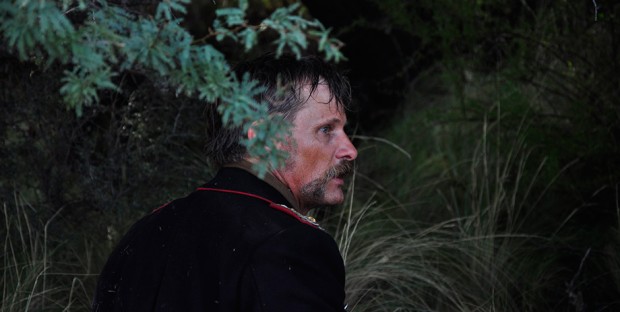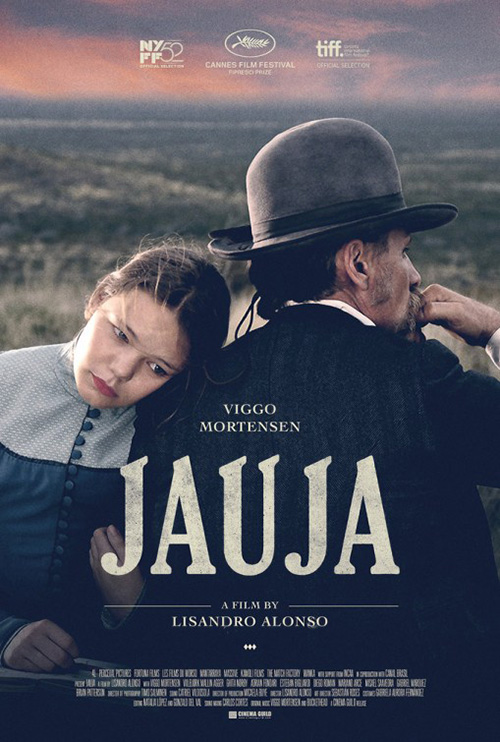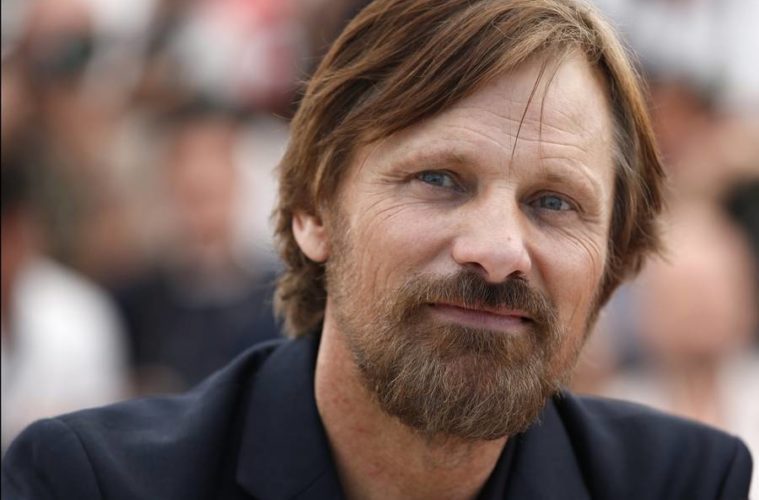
One of the year’s most striking films, Lisandro Alonso‘s Jauja, arrives in theaters this week after premiering at Cannes Film Festival last year. Led by Viggo Mortensen as his character journeys through a 19th-century Patagonia, we said in our review that it “might be described as a quasi-Herzogian experience into the rocky terrain of the Argentinean desert, but Alonso has made this journey of madness his own thing, a film so possibly deceitful with its ultimate meaning that it’s best to buckle your seatbelts and enjoy the ride.”
I recently had a chance to speak to Mortensen about the project, which he also co-produced and co-wrote the score for, his childhood, how he chooses certain projects and what specifically attracts him to them, the current state of Hollywood (or if there even is one), what his job is as a producer, and much more. Check out the full conversation below.
The Film Stage: Congrats on the film. It’s stunning. I’m curious with growing up in Argentina partially, what kind of memories returned for you when you were filming this project?
Viggo Mortensen: Well, I mean I’ve been back since I left there — I was eleven when I left — but I’ve been back since then, a long time after. From eleven to until I was in my early thirties or something like that, mid-thirties. But since then I’ve gone back a lot. The places we were in were more remote areas. I remembered them from when I would camp with my brothers and my parents. The landscapes, especially the grasslands, they were very familiar to me because I partially grew up there. There was a farm down there and that’s where I learned to ride. So it was lots of fun. It was interesting to revisit those memories, those smells, see those landscapes. Because I was playing someone who, like my father, is Danish with an accent, not unlike my father and his father, it made me think a lot about my dad as a little kid there.
My brothers and I, as kids, we thought our father was amusing because of his strong Danish accent when he spoke Spanish. We were raised there, so we spoke like any other kid there. And I thought it was funny and I also thought it was kind of amusing or I just dismissed it when my dad had trouble dealing with Argentineans’ punctuality, just a different mindset. Being down there just seemed so amusing to me as a kid, that was my memory of it. But playing a character like that, who also is having trouble connecting on a cultural level, it made me look at my father differently and realize, well, it wasn’t so easy. Sometimes movies can do that. They can teach you things about situations you thought you already knew everything about in your own life. I enjoyed that aspect of it.
Just trying to describe the film to people it feels wholly original but I’ve been saying to some it’s kind of like if Tarkovsky directed an existential western.
Yeah, it made me think of Tarkovsky a lot, just that unhurried pace. Sometimes things happen all of sudden, but generally they have their own particular rhythm that’s very true to the story which is unlike the way things are quote-unquote normally done. Lisandro, I don’t know if you’ve met him, but he’s not in anyway petulant about it or doing this for effect. It’s just what he’s comfortable doing. That’s his storytelling style, but there’s a lot of subtle things he did differently in this movie. I don’t know if you’ve seen his other movies, but he took a lot of chances in this; not just working with professional actors, but telling a real script using music, and probably the biggest risk for him or change was shot selection. There was a lot of trademark long-shots and [the] landscape is there. The humans enter, the humans leave, the landscape is there. It’s more permanent and so forth. But there are sequences, for example, when my characters gun is stolen and all that, there’s some flex. You suddenly feel like you’re watching a Howard Hawks western in some way. He’s more ambitious in terms of shot selection and cutting and it’s less straight-ahead visually then some of his other movies, I guess.
Yeah, I would say that approach and also mixed with the ending, I feel like it’s open to many interpretations. Do you prefer films that because of the mix of the photography, the long takes and also the ending, films that just have that lasting impact? Is that what you’re kinda going for when you seek out projects?
That end in that way?
It could be ending in that way or this is just a film I feel I won’t forget certainly all year and I’ll probably be thinking about for a long, long time.
Yeah, I do feel that way about this movie. First and foremost I look for stories that have the potential to be movies I’d like to go see. So of course that’s very subjective, because the kind of stories I like are the stories that have what you’re pointing out about this one: that they end and then leave you thinking. It’s open to interpretation, and you have something to discuss afterward, something to think about it. You know, I feel that about [David] Cronenberg’s movies, for example. The movies I’ve done with him and probably all of his movies, when they end you think, “Now what happens?”
Yeah, exactly.
What are they going to do or what does that mean, and so forth. I like movies that give you something to think about. I generally like artists not just filmmakers who ask a lot of questions or at least create a situation in which you are inspired to ask questions, but doesn’t give you answers, or they don’t give you the answers. I like that kind of filmmaking.

You said last year in an interview that 90% of films that are made are not really great and I have to agree with that notion. There’s just so much that just gets produced in Hollywood and elsewhere too that it’s almost mining for gold, finding projects that are worthwhile and, as a viewer, finding films that really connect with you.
Yeah, I think the overriding reason for that is commerce. But there is also the very real fact that it’s hard to write a story. Even if you have no commercial constraints and you have a producer that says, “I’ll produce whatever the hell you write. I don’t care what it is. I don’t care if it makes money or not.” I mean, that’s not very normal, but, I’ll say that happens. You still have to write the story that has to be captivating. It still has to have somethings singular, a rhythm, something memorable, depending on the viewer. It’s not easy to do, so it’s not purely, as far as commerce. Since I do work in Europe and South America, I mean I work outside of the “Hollywood system.” And when you ask someone, “What’s Hollywood?” You know, people keep throwing that around outside of the United States. “Well, it’s not like Hollywood, at least you’re doing movies that…” Well, I don’t know what you’re talking about, what is Hollywood? And they go, “Well you know, big productions and…” Well, there’s big productions out of England, most big boat Hollywood productions are there. You know, there’s money from Europe, China, from who knows where. There’s no such thing as Hollywood, really. Although I know what they mean; they mean big-budget movies that are constrained by their budget to reproduce formulaic stories that you’ve already seen with different window dressing and dialogue, but it’s basically unsurprising. But that happens all over the world. It’s not just there. It’s not a question of budget only. It happens a lot. It’s hard to tell an original story.
When people ask me about that outside the “Hollywood system,” I say, “I’m not willfully not doing movies like that.” A movie like Jauja or the French one coming out soon, Loin des hommes [Far From Men], or any other number of movies that I’ve done in recent years. In Two Faces of January, which on the face of it is an American movie, but it’s not. It’s an European movie, made by an English director. It’s an American story based on novel by an American writer but it’s still an unusual movie. All these movies, because they are somewhat original — some are very original like Jauja— they take time to get set up. And in the process of getting them set up sometimes offers do come in for an opportunity to do movies that are “Hollywood movies” or bigger budget movies that it’s tempting to say, “Well, yeah, that’s pretty much going be produced. It has a release date. It’s going to be distributed. There’s money to promote it.” But I’m sort of stubborn. Once I say “yes” to a story because it’s something I’d like to see made, I’d like to see in a movie theater, then I stay with it. These movies, including Jauja, generally take two or three years, sometimes more, to get made. So in that period I do miss out on some opportunities, but it’s not for lack of… it’s not because I’ve turned my back. A lot of people say, “Well, you obviously turned your back on Hollywood.” Well, I don’t know what you’re talking about. I’m just controlling my nose and I don’t really think about the nationality or language or budget when I’m looking at the story. As I said, I’m looking for something that I’d like to go see.
Yeah, some actors might sit back and say, “It’s hard to find the money now for these kind of movies.” But I feel like with you — the last few movies you’ve actually had a hand in producing — you’re going out and tracking down this material and not letting them come to you, but rather trying to find the stories to be told. Is that a reason why you wanted to produce the last few films that you’ve done?
Well, in both cases they’re both things that came to me and I looked at them. I thought, well there’s different ways to do this properly, because there’s second-time directors — Lisandro’s not a first-time or second-time, it’s his fifth time, but first time where he’s doing a movie where he’s using actors and he’s making some leaps forward in terms of type of cinematography used, kind of lighting. It’s just an extension of what always I tried to do in whatever way I could, which is help the director get their vision on the screen. And as I’ve worked over the years in the business I’ve realized there’s a lot that goes into that. Not just, which I could do simply and that’d be fine, just do my best as an actor and be supportive of the other actors in the scene and try to help him that way. And then walk away.
 But I’ve realized that a movie, as good as it might be made or shot, there’s a lot that can happen in what’s allowed to be done, what’s allowed to be shot, if the director is allowed or not to edit the movie the way he wants, and present the edit he wants finally to a film festival without interference, what the poster looks like, how it’s promoted. In the case of Jauja, what the title of it is, what’s it mean, how do we get it to people’s attention, all of these things. I just wanted to help. And as a producer, I obviously have. If I wanted to be, it is my business to help him with that and help the movie along. And with Jauja I also did invest in it. I didn’t do that with Loin des hommes, but I did help them in different ways as far as getting to the right film festival and other things. They’re very different situations. This was the third one that I’ve produced. I also did the first-time feature by Ana Piterbarg, an Argentine movie called Everybody Has a Plan, a pretty good story. The kind of story that I could see someone goes, “Oh, I’ll take that and make a Hollywood movie out of it” in English. Which you could do. I wouldn’t want to be part of it.
But I’ve realized that a movie, as good as it might be made or shot, there’s a lot that can happen in what’s allowed to be done, what’s allowed to be shot, if the director is allowed or not to edit the movie the way he wants, and present the edit he wants finally to a film festival without interference, what the poster looks like, how it’s promoted. In the case of Jauja, what the title of it is, what’s it mean, how do we get it to people’s attention, all of these things. I just wanted to help. And as a producer, I obviously have. If I wanted to be, it is my business to help him with that and help the movie along. And with Jauja I also did invest in it. I didn’t do that with Loin des hommes, but I did help them in different ways as far as getting to the right film festival and other things. They’re very different situations. This was the third one that I’ve produced. I also did the first-time feature by Ana Piterbarg, an Argentine movie called Everybody Has a Plan, a pretty good story. The kind of story that I could see someone goes, “Oh, I’ll take that and make a Hollywood movie out of it” in English. Which you could do. I wouldn’t want to be part of it.
You co-composed the music and there’s a transcendent scene where it kicks in for the first time. Can you talk about coming up with that, when he reaches the top of the mountain. Was that your idea solely for the music there, or did you collaborate?
Lisandro plans and works really hard and sets up, tries to get the right elements to shoot a movie. We shot the script, but there’s a couple things that happened in the course of making the movie. And when you plan everything is mostly him and he remains open to suggestions, by the photographer, just the circumstances of the day. At one point during the shoot, he said to me, “You know, that’s an important transition at nighttime. I would like to put music there.” It surprised me. He never used music in that way in a movie before. If there was music in the movie, it was just coming out of the radio, but he never had a music soundtrack. I thought what kind of music and he started to describe something lyrical, and I said, “Well, you know we don’t really have any money.” There’s not a lot of time and it’s not like we can go ask Bob Dylan for a song or something. [Both laugh]
He said, “I don’t want it to be anything that you would know what it was.” It was just, in our conversations, I said, “Well, there’s this guitar player I know and I’ve worked with for many years. I sent him a whole bunch of stuff that we’ve recorded together. He liked one track a lot from one of our records and then there’s another one he said, “I’d like to put at the end credits.” It has kind of like a cyclical structure, it goes with the story. I would have never imagined in my life I’d be contributing music to a movie so that was interesting. He’s like that. He stuck to the script, very strictly, but it was the last day, in this one location, and he said there’s something I’m missing between the father and the daughter is why he’s so desperate to find her. Is there more affection between them even though he’s formal military guy and not like a country guy? He’s a single father who doesn’t really know how to deal with an adolescent daughter. We could come up with something and we came up with something, which is the first scene in the movie. Then we shot it as the light was fading and it was one of my favorite scenes in the movie. It was really nice. It sets up a lot of things and more layers.
Jauja will hit NYC’s Film Society of Lincoln Center and IFC Center on Friday, March 20th and will expand in the coming weeks, courtesy of Cinema Guild.

